A new nightlife in Tibet
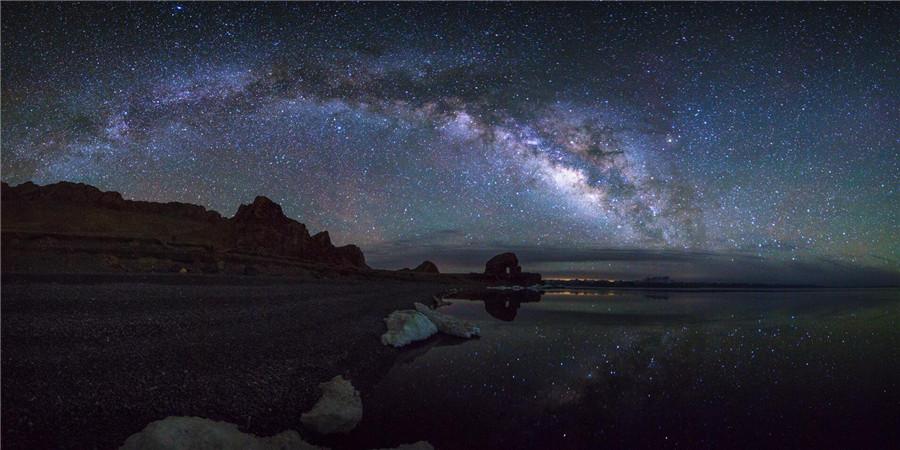
A Milky Way arch over Namtso Lake. [Photo/Xinhua]
From the Milky Way to meteor showers, the region is a stargazer's paradise.
The sunset glow on the snow-covered plateau is an enchanting opener for Tibet at night-a stargazer's paradise.
Xiao Bei, a tour guide in Southwest China's Tibet autonomous region, takes out his mobile phone and opens an app of star charts to find where the Milky Way will appear. Then he takes his tour group to the best place to set up their cameras, waiting for the stars over the Himalayas.
The previous night, they knelt by a puddle to capture the reflection of stars and Mount Kailash, regarded as a sacred mountain by Tibetans. This night, they lie on the ground to see the occasional meteors flying over the ruins of the mysterious 1,000-year-old Guge Kingdom in Ngari Prefecture, in western Tibet.
Xiao Bei and his partners run an outdoor club, which has run stargazing tours for the past three years.
The Perseid meteor shower in August attracted about 70 clients. Most of them come from large cities like Beijing, Shanghai and Guangzhou, where stargazing is a luxury. In Tibet, many of them see the Milky Way for the first time in their lives and take their first photos of a starry sky.
In 2014, Xiao Bei accompanied experts from the Guangzhou Astronomical Society around Tibet to take photos of the starlit night. That was the first time he was astonished by the brilliance of the stars.
The experts told him they couldn't predict what the camera would capture.
"That drew me in. It's a kind of exploration of the unknown. Although I spent a lot of time outdoors before, it was the first time I realized I should look up at the sky," he says.
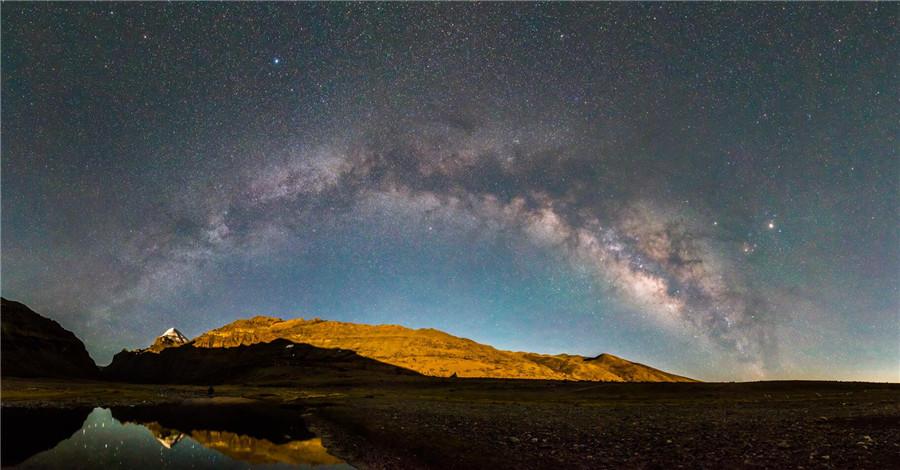
A Milky Way arch over Kangrinboqe Peak. The peak is said to be the center of the world in Buddhism. [Photo/Xinhua]
It brought back childhood memories of lying in his grandma's arms looking at stars over the wheat fields in his hometown in East China's Shandong province.
"In my hometown, economic growth has improved living standards, but brought serious pollution. It's hard to see stars there now."
He began driving to dark places on clear nights to enjoy the splendor of the stars and had the idea to add astronomical aspects to his tours. "If tourists from economically developed regions enjoy the starry nights of Tibet, that's great."
He teaches the tourists how to recognize the constellations, take photos of the Milky Way, and tells the stories behind the stars.
He and his partners also run a small astronomy-themed hotel in Lhasa, capital of Tibet. Guests can observe the moon and planets through telescopes on the roof terrace.
Kou Wen, a senior engineer with the Beijing Planetarium, helped Xiao Bei to promote astronomy activities in Tibet. He says Tibet, with its high altitude, beautiful scenery, lack of air and light pollution, is an international attraction for stargazers.
As Chinese become richer and can afford high-end cameras and astronomical equipment, stargazing has grown in popularity, Kou says.
Traditionally, only high-ranking monks in Tibet were qualified to study astronomy. They believed that celestial bodies had mysterious influences on the earth. These were revealed through observing the stars.
Xiao Bei's activities also attract ordinary Tibetans. Once he set up a telescope near his home and was soon surrounded by dozens of people who were surprised to see the moon through the telescope.
Fascination with the stars is universal.
At the end of 2016, Xiao Bei accompanied a British documentary crew to shoot the night sky at Yamdrok Lake. The freezing cold made the British crew stamp their feet. But when a meteor flew overhead, they all jumped and gasped with joy.
Hong Kong resident Stanley Chow and his wife, carrying a lot of photographic and astronomical equipment, come to Tibet to photograph the Milky Way.
"In Hong Kong, we cannot see so many stars," Chow says.
Deng Junjie, a college student from South China's Guangdong province, suffered from altitude sickness on arriving in Tibet. But when he saw the countless stars in Ngari, he says, he felt his soul was cleansed.
Xiao Bei says stargazing, and recognizing the size of the universe, has calmed his irritable personality and made him want to learn more.
In poverty-stricken Ngari Prefecture, a dark sky park has been set up to protect the night sky for stargazers.
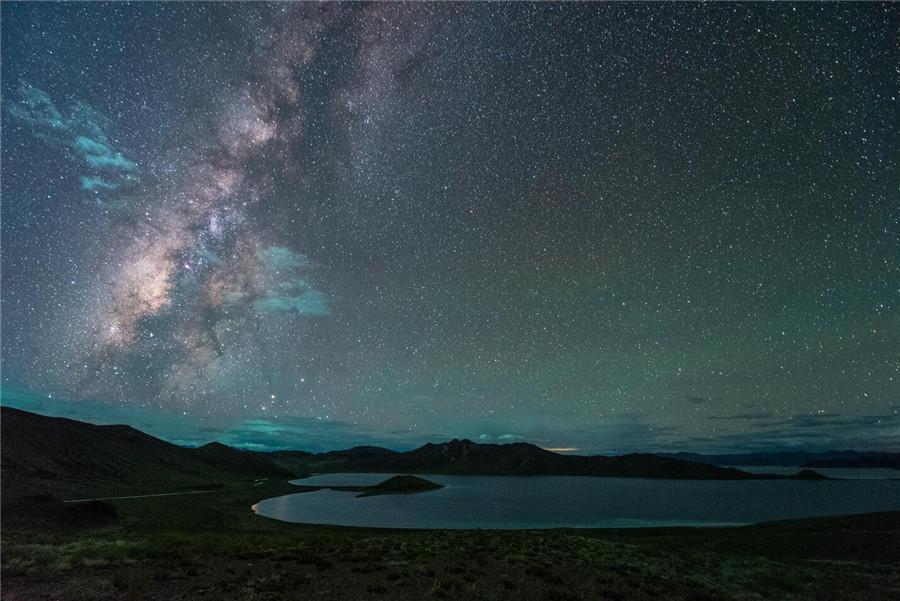
Starlit sky over Yamdrok Lake. [Photo/Xinhua]
Phuntsog, a commissioner of Ngari Prefectural Administrative Office, says the dark sky park will help the development of tourism.
"Poverty relief depends on education. A nation has no future if it is only concerned about things underfoot," Phuntsog says.
The bright clear sky of Tibet is also precious to scientists.
China has launched a project to detect primary gravitational waves in Ngari. Scientists also plan to conduct high-precision detection of cosmic rays and build China's largest optical telescope there.
Xue Suijian, deputy director of the National Astronomical Observatories of China, says China should utilize the unique geographical advantage of the "roof of the world" to build an astronomical base in Ngari.
Your Comment
Name E-mailRelated News
-
;
-
-
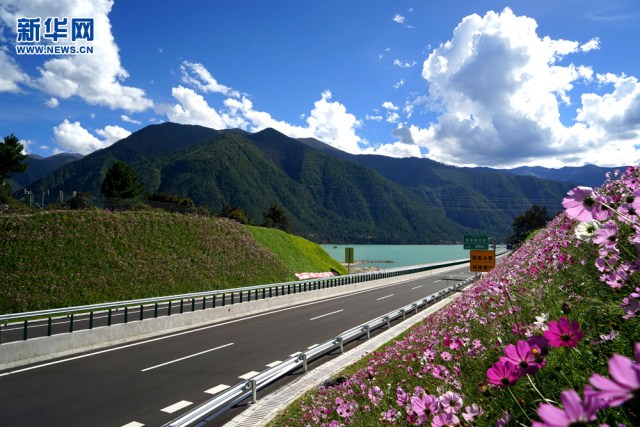
-
Tibet opens Lhasa-Nyingchi expressway
An expressway opened Sunday linking Lhasa and Nyingchi, the two major cities and tourist attractions in Tibet Autonomous Region.
-
-
-
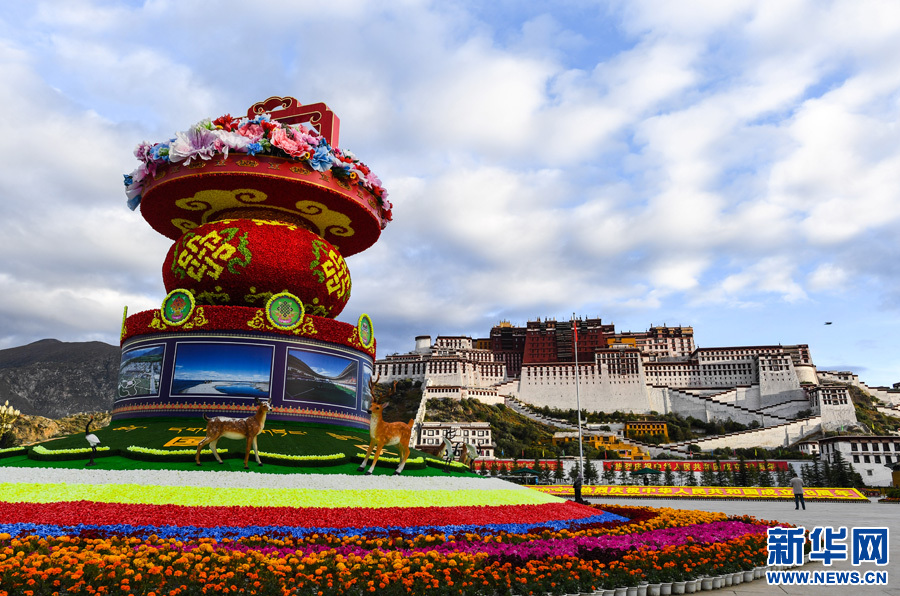
-
Tibet receives 1.2 mln tourists during holiday
Southwest China's Tibet Autonomous Region received more than 1.2 million tourists, up 16.5 percent year on year, during the National Day holiday, local tourism authorities said Monday.
-
-
-

-
Tibetan culture comes to college campuses in Taiwan
On Sept. 22, a fine art exhibition of thangka paintings was opened at Taiwan’s Cheng Shiu University and more than 50 outstanding paintings from the four major schools of thangka paintings were showed.
-
Based in Lhasa, Tibet Vista is a Tibet travel agency that specialized in Tibet permit, and Tibet tours for both private and group travelers at a local price!
•4 Days Lhasa City Group Tour from USD 460 •8 Days Everest Base Camp Group Tour from USD 850 •15 Days Mt.Kailash Group Tour from USD 1780 •2016 Tibet Train Tours from Beijing, Shanghai, Chengdu, Xining,etc










